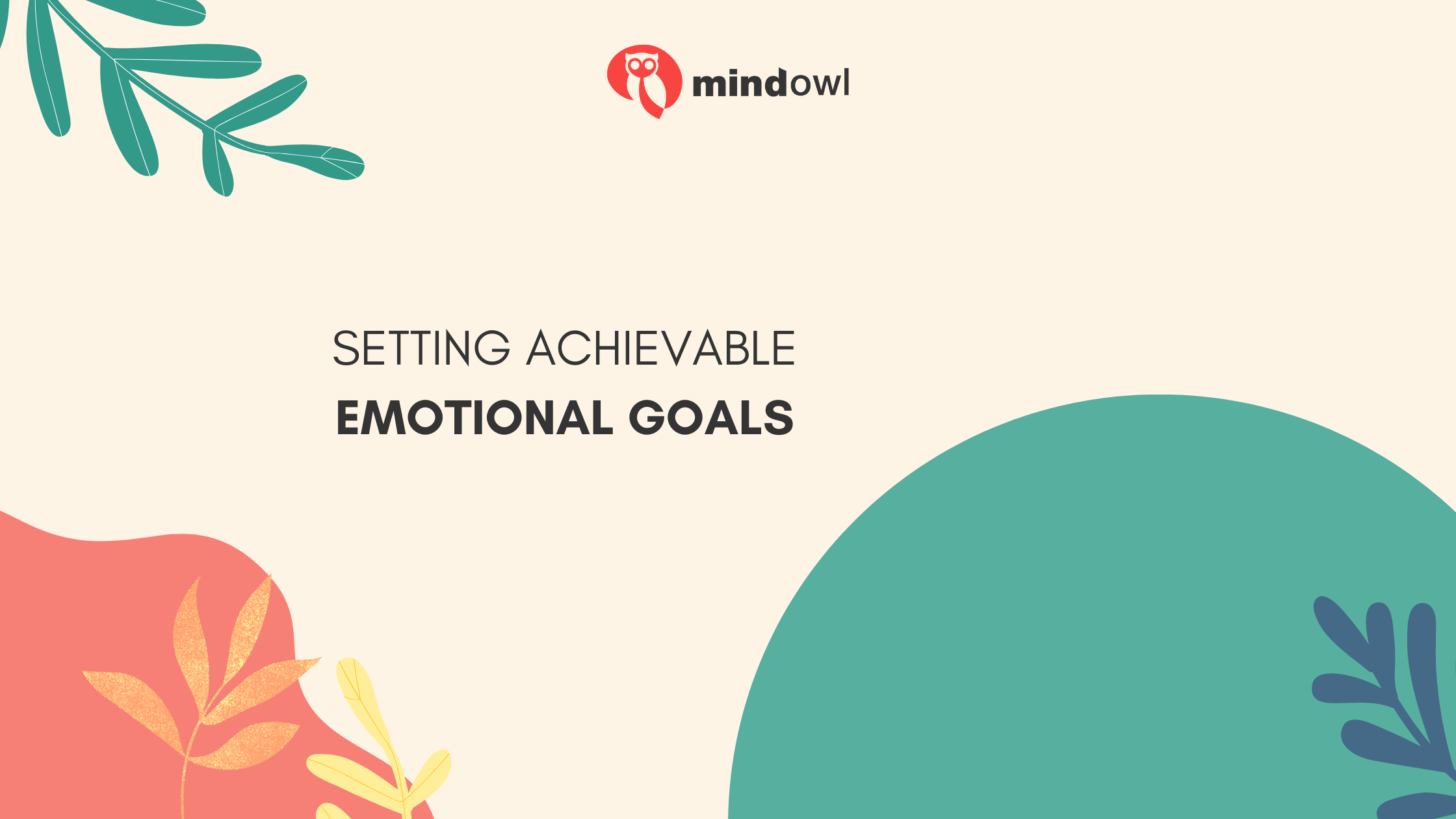Many of us want to feel better in our lives but don’t know where to start. We might feel stuck or unsure how to make positive changes. This is common, and you’re not alone if you feel this way.
Emotional goals can guide us on a path to wellness and better mental health.
Research shows that setting emotional objectives can have a profound impact on our overall well-being. This article will show you how to set realistic emotional targets that fit into your life.
You’ll learn ways to improve your feelings, handle stress, and build stronger relationships. Ready? Let’s begin the journey together.
Understanding Emotional Goals
Emotional goals focus on improving your emotional health. They guide how you manage feelings and thoughts. These goals aim for a better state of mind, making it easier to cope with life’s challenges.
Setting them helps you gain control over reactions and build resilience against stress.
Emotional goals are the compass that directs our mental health journey.
Examples include learning to express feelings in healthy ways or finding joy in daily activities. Emotional intelligence plays a key role here, as it involves understanding your emotions and those of others.
Achieving these aims can boost your overall mental well-being, making everyday tasks more manageable and enriching personal development.

The Importance of Setting Emotional Goals
Setting emotional goals is essential for personal and professional growth, as they can enhance resilience and improve mental health. Developing achievable emotional objectives helps individuals to cultivate stronger self-awareness, regulate their emotions effectively, and foster meaningful relationships.
Enhances personal and professional growth
Organising emotional well-being objectives augments personal and professional development. Reaching these goals assists in refining self-respect, interpersonal aptitudes, and your capacity to manage pressure.
You develop heightened resilience, a necessary skill during fluctuating life scenarios.
Integrating habits such as mindfulness into your schedule fosters superior judgement and trouble-shooting capabilities. This could translate into marked advancement in your vocation too.
Emotional progression enables robust social bonds, reinforcing collaboration abilities in a professional environment.
Builds resilience and improves mental health
Creating emotional goals can bolster your resilience and mental health substantially. This procedure involves understanding how to govern thoughts and emotions effectively. Through practising tension-relief tactics such as mindfulness and deep breathing, individuals create a solid base for confronting life’s predicaments.
It endows them with the power to recover from obstacles more rapidly, boosting their overall mental health.
The greatest weapon against stress is our ability to choose one thought over another. – William James
Adopting habits such as adequate sleep, consistent physical activity, and valuable time spent in social relations nurtures psychological resilience. These measures aid in sheltering against chronic stress and anxiety by enhancing mood and cognitive function.
Confronting daily stresses becomes less intimidating, encouraging a healthier emotional condition that has a positive impact on personal development and self-esteem.
Examples of Achievable Emotional Goals
Practising gratitude daily can improve emotional well-being. Developing effective communication skills is essential for building strong relationships.
Practise gratitude daily
Taking time each day to acknowledge the good in your life can make a big difference. Start a journal where you note down things you’re thankful for every evening. This simple act of writing helps shift your mindset towards noticing positive elements around you, enhancing emotional wellness.
Gratitude journaling is not just an exercise but also a step towards cultivating a more optimistic attitude.
Incorporating gratitude into your routine encourages you to appreciate small wins and pleasures, nurturing contentment. Make it a goal to reflect on at least three aspects of your day that brought joy or satisfaction before going to bed.
Doing so trains your brain to scan for positives rather than dwelling on stressors, leading towards improved mental health and resilience against psychological stress.
Develop effective communication skills
Improving your communication skills will profoundly impact both your personal and professional life. These skills help protect against misunderstandings and can enhance social connections.
Start with practising mindfulness during conversations, showing that you truly listen. It means paying attention, making eye contact, and not just waiting for your turn to speak.
To develop effective communication skills, work on expressing your thoughts and feelings clearly. It’s about choosing simple words that carry meaning without causing confusion or offence.
This effort makes every interaction more meaningful. Include practices such as daily gratitude to reinforce positive relationships and try speaking in a supportive tone whenever you discuss sensitive topics.
Effective communication is the bridge between confusion and clarity.
Manage stress through mindfulness
Practising mindfulness helps you manage stress effectively. This approach involves taking deep breaths and focusing on the present moment. You learn to observe your thoughts and feelings without judgement.
Mindfulness can be done through meditation, guided imagery, or mindful eating. These methods teach you to calm your mind in stressful situations.
Starting with just a few minutes each day can make a big difference. Set aside time for mindfulness exercises like meditation or take some deep breaths whenever you feel overwhelmed.
Regular practice improves your ability to handle life’s challenges with more ease and improves your overall mental health.
Foster strong, supportive relationships
Creating strong, supportive relationships plays a key role in our emotional growth. These bonds act as a support system that can help you move toward your goals and manage life’s difficulties more efficiently.
Everyone needs individuals they can rely on during tough periods, such as stress or sorrow. By dedicating time and effort to building these connections, you do not only improve your mental health but also enhance your ability to deal with various situations.
To develop these relationships, it’s necessary to devote quality time to those who are most important to you. This could involve frequent get-togethers or simple activities like keeping in touch through calls or messages at least once a week.
Sharing experiences and offering reciprocal assistance fortifies these connections considerably. It allows both parties to develop social abilities and build trust over time, making the relationship more robust and more supportive.
Steps to Setting and Achieving Emotional Goals
Understanding your core values and desires is the first step. Then, setting SMART emotional goals will guide you in achieving them. Establishing supportive habits and routines plays a vital role in ensuring success.
Identify your core values and desires
Recognising your core values and desires is crucial to setting achievable emotional goals. It involves reflecting on what truly matters to you and what drives your actions and decisions.
By understanding these foundational elements, you can align your emotional goals with what genuinely resonates with you, leading to greater motivation and fulfilment in pursuing them.
Moreover, acknowledging your core values enables a deeper connection with yourself, fostering self-awareness and authenticity in your emotional growth journey. This introspective process lays the groundwork for meaningful goal-setting that is personally significant and impactful.
It’s important to note that identifying core values is not a one-size-fits-all approach; it’s a deeply personal exploration unique to each individual. While some individuals may prioritise traits like compassion or integrity as their core values, others may place more emphasis on ambition or creativity.
Similarly, desires can encompass a wide spectrum of aspirations – from seeking genuine connections with others to striving for inner peace and contentment. Taking the time to pinpoint your distinct set of core values and desires empowers you to formulate emotional goals that are truly resonant and aligned with your authentic self.
Set SMART emotional goals
Furthermore, these objectives must be applicable to the person’s emotional needs and aspirations while also being time-bound, providing a deadline for achievement.
Establish supportive habits and routines
Establishing supportive habits and routines is vital for achieving emotional goals. By integrating self-care practices such as prioritising sufficient sleep, balanced eating, and regular physical activity into your daily schedule, you can enhance your overall emotional well-being.
Moreover, practising mindfulness and relaxation techniques such as progressive muscle relaxation can aid in managing stress and promoting emotional well-being. Creating a structured routine that incorporates time for self-reflection and social interactions can also nurture emotional regulation and resilience.
Developing the ability to identify and regulate emotions across all contexts is fundamental for reaching emotional goals. Allocating dedicated time each day for these habits ensures they become integrated into your lifestyle.
Seeking assistance from mental health professionals or supportive individuals when necessary, and adapting coping strategies to individual requirements, further promotes the establishment of beneficial habits conducive to emotional growth.
Conclusion
To sum up, establishing attainable emotional goals is vital for personal and professional development. By recognising fundamental values and aspirations, individuals can set SMART emotional goals such as engaging in a daily gratitude practice, honing effective communication skills, cultivating stress management through mindfulness, and nurturing strong relationships.
Pursuing tangible steps towards these aims boosts resilience and mental wellness. By customising supportive habits and routines to reinforce these goals, individuals can take control of their mental well-being and enhance their overall emotional state.
MindOwl Founder – My own struggles in life have led me to this path of understanding the human condition. I graduated with a bachelor’s degree in philosophy before completing a master’s degree in psychology at Regent’s University London. I then completed a postgraduate diploma in philosophical counselling before being trained in ACT (Acceptance and commitment therapy).
I’ve spent the last eight years studying the encounter of meditative practices with modern psychology.

